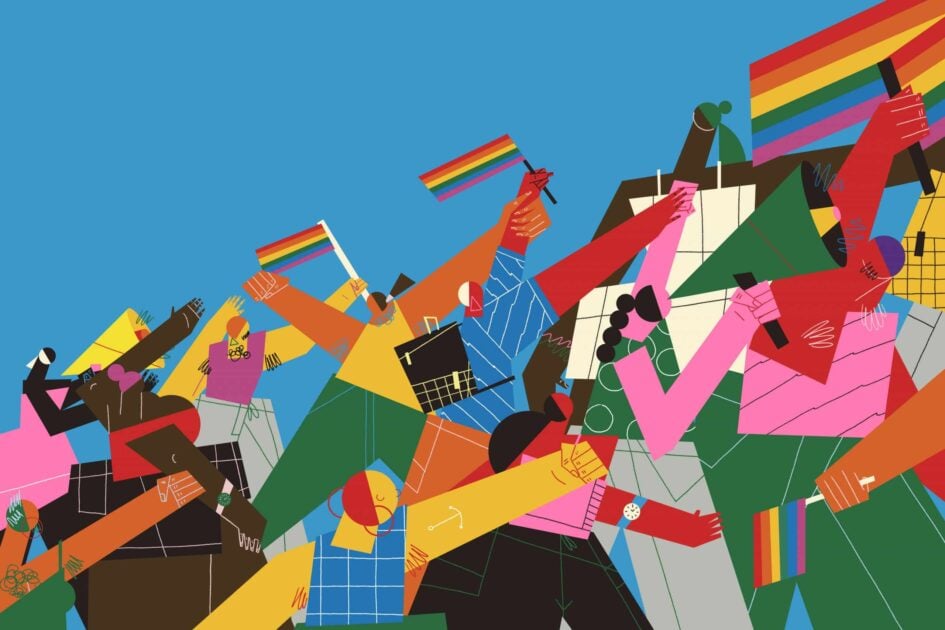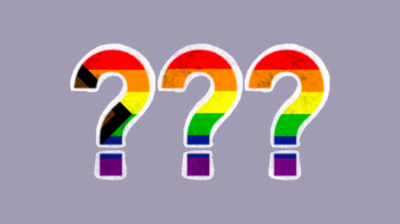A-Z of sexual identity
Our crash course in sexual identities

What is sexual identity?
Sexual identity is a term that is used to describe a person’s own identity in terms of the gender, or genders, of the people they are attracted to sexually and/or romantically. Some common sexual identities are straight, gay, lesbian, or bisexual, but there’s a whole range of other terms and language around sexuality that are important to know. Sometimes, sexual identity is confused with gender identity. However, sexual identity describes what gender or genders you’re attracted to, and gender identity describes what gender or genders you are.
Please note, that although we tried to list as many terms as we can here, sexual identity is personal, and new terms are being developed to describe different identities and ways of thinking about sexual identity and attraction all the time. It’s always important to respect everyone’s sexual identity, even if they identify as something you’ve never heard of before.
Sexual identity can be fluid, meaning that it can change and move, and many people identify with different sexualities at different stages of their lives. It’s normal to question your sexual identity and to identify with something different than what you did before. Plenty of people also choose not to label their sexuality at all.
We understand that if your particular sexual identity isn’t represented or accurately described by popular terms, you could feel alienated and alone. But however you identify is equally important, even if there’s no popular word out there that describes it. You might just be a bit ahead of your time, and society and language will catch up with you eventually.
A-Z of sexual identity
- Abrosexual
- Asexual
- Bisexual
- Coming Out
- Gay
- Lesbian
- LGBTQIA+
- MSM
- Omnisexual
- Pansexual
- Queer
- Questioning
- Straight
Abrosexual
Abrosexual describes a person’s sexual attraction that is fluid and constantly changing.
Asexual
Asexual is the term used to describe people who feel little or no sexual attraction to anyone. Asexual people can have romantic feelings and the strength of those feelings can vary from person to person. Someone with no romantic attraction might identify as ‘aromantic.’
Bisexual
Bisexual is the term used to describe people who are sexually attracted to people of more than one gender. It is sometimes shortened to just “bi”.
Coming out
Coming out is the process of identifying your sexual or gender identity. Coming out can be a personal, as well as a more public process. You can come out to yourself, or choose to share your identity with the people in your life. It is not a one-off occasion, but an ongoing process.
Gay
This is used to describe people who are attracted to people of the same gender. Some gay women will prefer to refer to themselves as lesbians.
Lesbian
This is a word used to describe women who are attracted to other women. Some of these women will prefer to simply describe themselves as gay.
LGBTQIA+
LGBTI+ is a commonly used acronym for Lesbian, Gay, Bisexual, Transgender, and Intersex. Sometimes the acronym is expanded to LGBTQIA+ or other versions that include Queer or Questioning and Asexual. The + sign is to signify other categories of gender and sexual identity that aren’t accurately described by these terms. Sometimes it is shortened to just LGBT.
MSM
An acronym for “men who have sex with men.” People who fall under this category do not necessarily identify as gay or bisexual, but may be straight men who have had sexual experiences with men at different stages of their life. This term is mostly used in academic and medical settings.
Omnisexual
Omnisexual refers to someone attracted to people of all genders, and for whom gender plays an essential part in their attraction experience.
Pansexual
This is used to describe someone who can be attracted to people irrespective of gender identity and expression. They might be attracted to people who are cisgender, transgender, and nonbinary, or feel that the gender identity or expression of their partners is not an important factor in their attraction.
Queer
Some people use this word as an alternative to LGBTI+. Other people may use it to explain their gender, sexuality or political identity. Historically queer has been used as a slur against LGBTQ+ people, and some will still be offended by it, though others have reclaimed the word as empowering for themselves. As such, it’s only ok to use it about another person if that person self-identifies as queer.
Questioning
This is when someone is unsure of their sexual or gender identity and are in the process of questioning it. Many people, of all different identities, go through phases of questioning in their life.
Straight
This word is used to describe someone who is attracted to people of a different gender than their own. It is often used interchangeably with the word heterosexual.
LGTBI+ supports for young people in Ireland
Read our article for more information on some of the LGBTI+ support services for young people in Ireland.
Text About It
Feeling overwhelmed or want to talk to someone right now?
- Get anonymous support 24/7 with our text message support service
- Connect with a trained volunteer who will listen to you, and help you to move forward feeling better
- Free-text SPUNOUT to 50808 to begin
- Find out more about our text message support service
If you are a customer of the 48 or An Post network or cannot get through using the ‘50808’ short code please text HELLO to 086 1800 280 (standard message rates may apply). Some smaller networks do not support short codes like ‘50808’.
Need more information?
We are here to answer your questions and talk through your options. Our online chat service is for 16 to 25 year olds and is available Monday to Friday, 4pm to 8pm. Chat to us now about your situation.
- Chat now to a trained Youth Information Officer
- Or leave us a message and we will email you back






